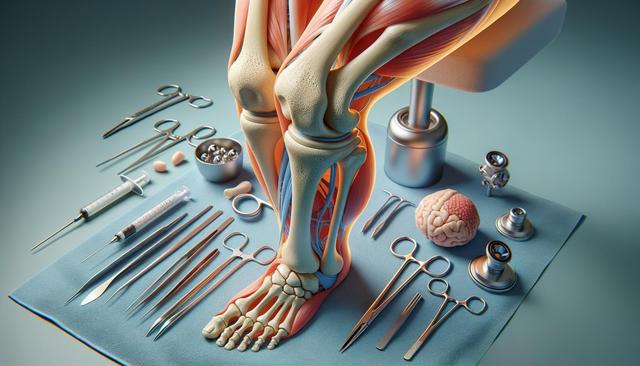Preparing for Knee Surgery: What to Know
Proper preparation before undergoing knee surgery is a crucial step in ensuring a smoother recovery. Knowing what to expect can help reduce anxiety and set realistic expectations for the healing process. It starts with understanding the type of surgery being performed—whether it’s a partial or total knee replacement, arthroscopy, or ligament reconstruction. Each procedure has its own unique recovery timeline and post-operative considerations. Patients are encouraged to meet with their healthcare team to discuss the surgery in detail, ask questions, and clarify any concerns.
In the weeks leading up to the procedure, certain preparations can help to optimize outcomes:
- Arrange for help at home during the initial recovery period.
- Set up a safe, accessible living space to avoid unnecessary strain on the knee.
- Follow pre-surgery guidelines related to medications, fasting, or lifestyle changes.
Focusing on “Preparing for Knee Surgery: What to Know” also includes mental preparation. Understanding that recovery is gradual and requires patience can make a significant difference in maintaining a positive mindset throughout the journey.
Nutrition and Healing: Supporting the Body from Within
Nutrition plays a pivotal role in the recovery process after knee surgery. A well-balanced diet supports tissue repair, reduces inflammation, and helps maintain muscle mass during periods of limited mobility. Prioritizing nutrient-dense foods can provide the body with the resources it needs to heal efficiently and effectively.
Key nutritional strategies include:
- Increasing protein intake to support muscle and tissue repair.
- Incorporating fruits and vegetables rich in vitamins C and E to aid in wound healing and reduce oxidative stress.
- Staying hydrated to support joint health and metabolic functions.
Focusing on “Nutrition and Healing: Supporting the Body from Within” is not just about short-term recovery; it also helps in building a stronger foundation for long-term joint health. Consulting with a nutritionist or dietitian can provide individualized guidance tailored to specific dietary needs and medical conditions.
Physical Therapy and Mobility Post-Surgery
One of the most critical components of knee surgery recovery is physical therapy. After the initial healing period, restoring mobility, strength, and flexibility becomes the primary focus. A structured physical therapy plan, often supervised by a licensed therapist, helps guide patients through exercises that are safe and effective for their stage of recovery.
Typical goals of post-surgical physical therapy include:
- Improving range of motion in the knee joint.
- Rebuilding strength in surrounding muscles to support the knee.
- Reducing stiffness and swelling through controlled movements.
Following a consistent regimen under the theme of “Physical Therapy and Mobility Post-Surgery” can significantly enhance the quality of recovery. Patients are encouraged to communicate openly with their therapists about pain levels or difficulties to ensure that the therapy plan is appropriately adjusted.
Daily Care and At-Home Recovery Practices
At-home recovery plays a substantial role in the healing timeline following knee surgery. Daily care involves managing pain, preventing complications, and gradually returning to normal activities. Creating a routine that balances rest and activity can help maintain physical and mental well-being during this period.
Effective at-home recovery practices include:
- Adhering to prescribed medication schedules to manage pain and inflammation.
- Applying ice and elevating the leg to reduce swelling.
- Using assistive devices as recommended to prevent falls and minimize knee strain.
Monitoring incision sites for signs of infection and keeping follow-up appointments are also essential for tracking progress. Embracing “Daily Care and At-Home Recovery Practices” empowers individuals to take an active role in their healing, often resulting in a more confident and efficient recovery process.
Staying Motivated and Monitoring Progress
Staying motivated throughout the recovery process can be challenging, particularly during slower phases of healing. Setting measurable goals and acknowledging small victories can help maintain morale and encourage continued effort. Regularly tracking progress—whether through physical benchmarks, pain levels, or mobility improvements—provides valuable feedback and reinforces a positive outlook.
Strategies for maintaining motivation include:
- Journaling to document daily achievements and setbacks.
- Celebrating milestones such as walking unaided or returning to work.
- Connecting with support groups or others who have undergone similar procedures.
Incorporating the principle of “Staying Motivated and Monitoring Progress” ensures that patients remain engaged and proactive during recovery. Emotional well-being is just as important as physical healing, and maintaining a sense of purpose can significantly contribute to overall recovery success.
Conclusion: Building a Roadmap to Recovery
Recovering from knee surgery requires a multifaceted approach that includes preparation, proper nutrition, physical rehabilitation, and consistent at-home care. By understanding each phase of the healing journey and applying practical strategies—such as those outlined in “Preparing for Knee Surgery: What to Know,” “Nutrition and Healing: Supporting the Body from Within,” and “Physical Therapy and Mobility Post-Surgery”—individuals can build a comprehensive recovery plan tailored to their needs. Adding daily care routines and staying motivated through progress tracking further enhances the recovery experience. For anyone undergoing knee surgery, taking a thoughtful and proactive approach can lead to meaningful improvements in mobility, comfort, and overall quality of life.




Leave a Reply